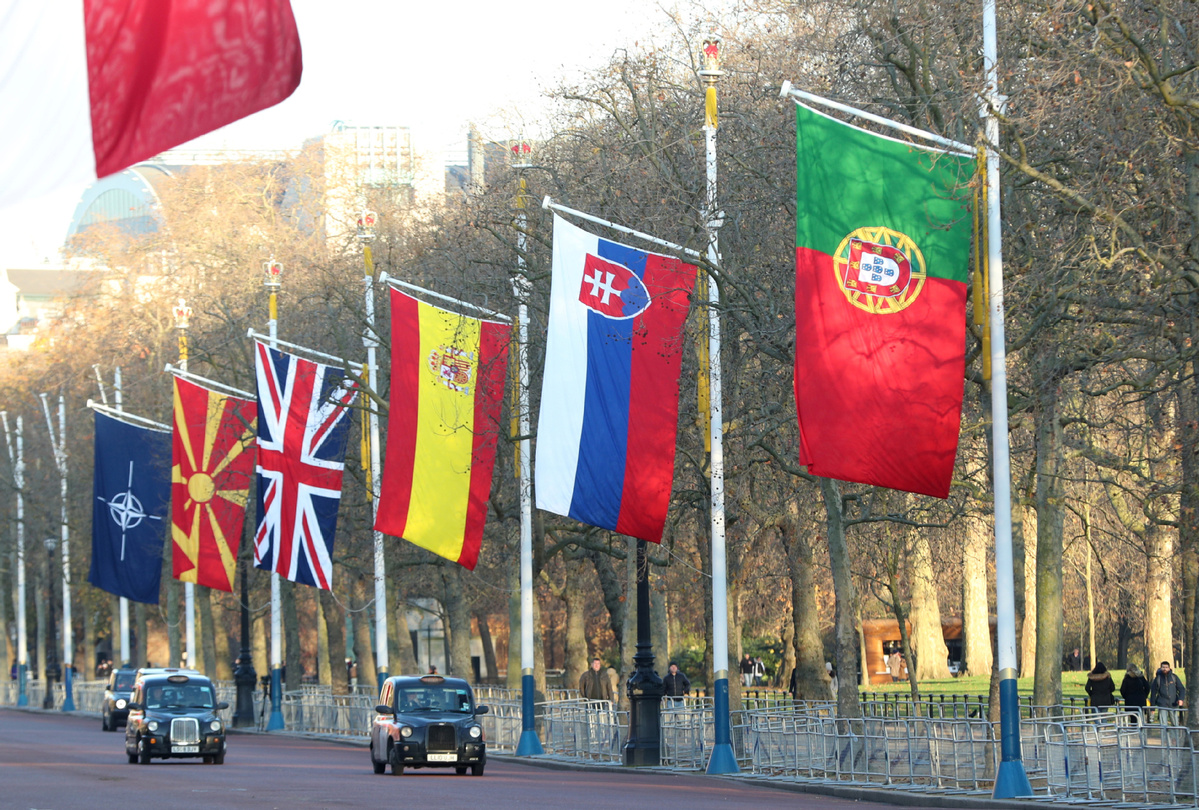Transatlantic tensions mean Europe more dependent on China trade
By Harvey Morris | China Daily Global | Updated: 2019-12-03 09:44
Leaders of the North Atlantic Treaty Organization, also known as NATO, have gathered in London this week to mark the organization's 70th anniversary, and ponder how it might deal with one of the biggest threats it faces: United States President Donald Trump.

On matters of mutual defense, as in the areas of trade and climate protection, Europe appears increasingly estranged from a US administration that has replaced belief in international cooperation with the doctrine of "America First".
France's President Emmanuel Macron has warned that European countries can no longer rely on the US to come to the defense of its NATO allies, suggesting the transatlantic alliance was undergoing "brain death".
Last month he told The Economist magazine that Europe stood on the edge of a precipice, and needed to start thinking of itself strategically as a geopolitical power or it would no longer be in charge of its destiny.
On a range of issues and policies, Europe now finds itself at odds with the country that has been its most important ally since World War II.
"For the first time in history, there is an American president who is openly against a united Europe," said outgoing European Council President Donald Tusk. "He supports Brexit and prays for the breakup of the Union."
Similarly, on climate change, Trump alarmed his European partners by announcing his intention to unilaterally withdraw from the 2015 Paris Climate Agreement.
European officials have suggested that only way US voters can now keep their country inside the pact is by denying Trump a second term in next November's presidential election.
On a visit to Beijing, Macron said that cooperation between Europe and China on the climate issue would now be decisive. "Next year we need, in the agenda of enhancement, to be collectively up to the task," he said.
The international agreement governing Iran's nuclear program is another matter of contention between Washington and the capitals of Europe.
European signatories not only oppose Trump's decision to renege on the agreement, they are also actively trying to work around US sanctions imposed on Teheran.
Days ahead of the NATO gathering, six more European countries signed up to a new financial mechanism launched by the UK, France and Germany that private companies could use to bypass the US restrictions.
Overshadowing even these policy divisions between Europe and the US is the issue of world trade. Although the headline trade conflict is the one Trump launched against China when he came to office, the Europeans have also been in the firing line.
Trump has described the EU as "worse than China, just smaller" and has targeted European trade in areas that include automobiles, aviation and agriculture.
Recent official figures indicated the slowdown in global trade has hit the EU hardest. Germany's growth has narrowed, adding to problems stemming from Trump's trade war on China and the UK's Brexit process.
"European merchandise trade has been impacted significantly by uncertainty surrounding the trade war and Brexit," Timme Spakman, an economist at Dutch banking group ING, told the Financial Times.
Trump is now threatening to paralyze the work of the World Trade Organization (WTO), which was established to monitor international trade, apparently because its arbitrators are not sympathetic enough to the US stance in trade disputes.
Denis Redonnet, the EU official in charge of trade strategy, recently told an interviewer that the demise of the WTO would put trade at the mercy of other diplomatic, security and political priorities. "Now the WTO is in crisis and the EU is on the front line of the fight to save it," he said.
On many aspects of the current transatlantic tensions-free trade, climate change, the Iran nuclear deal-the Europeans find themselves more closely aligned to the positions of China than to those of their traditional US ally.
The export-based European economies are now almost as dependent on their trade relations with China as on their traditional partnership with the US.
The Europeans are nevertheless wary of exchanging a US relationship for a Chinese one and EU leaders such as Macron believe in establishing an independent course for the continent as a world power in its own right.
A strategic outlook published this year by the European Commission described China as a cooperation partner with whom the EU had closely aligned objectives and a negotiating partner with whom the EU needed to find a balance of interests, as well as an economic competitor in the pursuit of technological leadership, and a systemic rival promoting alternative models of governance.
The EU's objectives should include deepening its engagement with China to promote common interests at a global level, the commission said.
To put it another way, China and Europe find themselves in the same boat when it comes to dealing with an erratic and inward-looking White House. Where there is common ground, Brussels and Beijing would be as well to stick together to preserve a cooperative world order in their own interests and that of the wider world.
harvey.morris@gmail.com Harvey
Morris is a senior media consultant for China Daily UK























